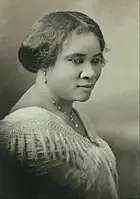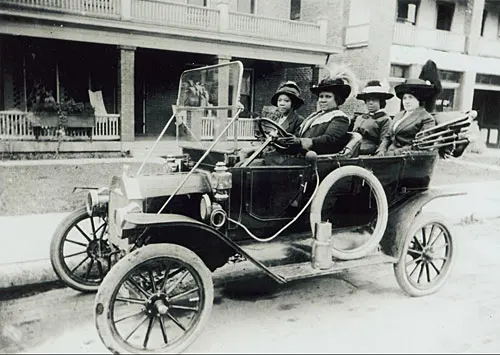As the daughter of newly freed slaves on a Louisiana plantation, Sarah Breedlove's prospects at birth in 1867 foretold grinding poverty and toil. Over time, she graduated from the cotton fields to the washtub, marrying at the age of 14 and giving birth 3 years later to her only child, a daughter. By 1910, however, with the new name Madam C.J. Walker, Breedlove had accrued a sizable fortune and considerable influence. This daughter of adversity was now well known and respected among the nation's African Americans as a savvy entrepreneur with a thriving business based on hair-care products sold by nearly 1,000 female sales agents across the country.
How did Walker journey from the cotton fields to the status of an enterprising businesswoman, perhaps even the first self-made African American millionaire in the United States? Her obstacles, shrewd strategic moves, ambition, and grit—complete with a social conscience—form the basis of a new Harvard Business School case, "Madam C.J. Walker: Entrepreneur, Leader, and Philanthropist." Professor Nancy F. Koehn, a leading historian, coauthored the case with HBS research associates Anne E. Dwojeski, William Grundy, Erica Helms, and Katherine Miller. When Koehn recently taught "Madam C.J. Walker" in her MBA course Entrepreneurial Leadership: Past, Present, and Future, her students in turn discussed Walker's rise against a historical backdrop dominated by hard-driving industrialists such as Henry Ford and Alfred Sloan.
As the case shows, Walker herself reflected on her path before an audience in 1912 at the National Negro Business League convention in Chicago: "I was promoted to the cook kitchen, and from there I promoted myself into the business of manufacturing hair goods and preparations. … I am not ashamed of my humble beginning. Don't think because you have to go down in the wash-tub that you are any less a lady!"
"She Found A Way"
Koehn landed on the story almost by accident while researching her 2001 book, Brand New: How Entrepreneurs Earned Consumers' Trust from Wedgwood to Dell. One chapter in Brand New relays the innovations of beauty-business pioneer Estée Lauder, and while examining Lauder's rise, Koehn became intrigued by a pivotal figure earlier in the 20th century whose signature product was the boldly named "Madam C.J. Walker's Wonderful Hair Grower." As Koehn discovered, Walker had lived an entrepreneurial life that was dramatic and deeply complex on many levels.
"I think much of Walker's business model and her animating vision is a product of the constraints that she faced," observes Koehn. "She had an indomitable spirit that prevailed through the difficulties of finding capital, and through the difficulties of her own very limited social position. In a market in which there weren't many realms where women could play, she found a way.
"She lived on a fascinating threshold between the end of slavery, the beginnings of the great migration northward by African Americans, and the opening up of consumer capitalism."
Women Take The Stage As Consumers
Walker may have catered primarily to an African American clientele, yet her ideas and methods—such as personal charisma combined with an army of "beauty evangelists," as well as appealing and effective products that inspired consumer loyalty—held sway over the popularization of beauty products that were just emerging for all women, black as well as white. All told, her central message was pride and empowerment. As Koehn and Miller explained in a recent interview, women in large numbers were stepping out onto the public stage as members of the workforce and were adopting a more defined role as consumers.

Madam C.J. Walker.
Photo courtesy
A'Lelia Bundles/
Walker Family Collection/
madamcjwalker.com
"As recently as the 1860s, it was not acceptable in all cities for women to shop by themselves, to be out on the streets actively spending money. So this is one important aspect of a sea change," says Koehn.
"Madam Walker was part and parcel of that evolution and can't really be separated from it. We shouldn't think of the beauty industry as some kind of conspiratorial development that was imposed by manipulative entrepreneurs trying to make women feel a certain way. It was much more organic and part of a huge social transformation."
Church And Capital
One of the secrets to Walker's success was tapping into the remarkably active African American social life that revolved around church, adds Miller. Walker associated comfortably with churchgoing folk, and while maintaining her punishing schedule of business travel by train, she was invited to stay in the homes of local black leaders, such as doctors and ministers, who were steeped in their church communities. As a black woman, no matter how wealthy she was, she would not have been welcome or even allowed in any respectable hotel. Her church connections also formed the basis of her agent network and helped build word-of-mouth advertising for her products.
What drove Walker most, Miller suggests, may have been more personal: the desire to provide her only child, Lelia, with a better life and the formal education that she herself had never received. (Lelia later became a prominent hostess and esteemed participant in the Harlem Renaissance during the 1920s.) She was also determined that other African American women would be able to rise above their circumstances.
Walker's name change from Sarah Breedlove to something both catchier and more dignified was a smart career move that reflected her style and marketing flair, Miller says. "White people in those days would call African Americans 'Aunt' or 'Uncle' or by their first name, Ben or Sarah or whatever. They would never address them by their surname." Although Breedlove's marriage to a newspaper advertising salesman named Charles Joseph Walker lasted only 6 years, his business ideas—and his name—proved useful. By 1906 she was referring to herself as Madam C.J. Walker.
Says Koehn, "Estée Lauder, Helena Rubinstein, and Elizabeth Arden all have interesting stories of changing their names. Part of it, I think, was about positioning their business and their product and themselves as having a particular identity. And there's a piece of this in Madam Walker's decision to buck the tide in how African Americans were known by whites. This was about signaling her own self-respect and that for other African Americans" by using a surname and Madam.
Did Walker's premium hair treatment, the "Wonderful Hair Grower," fulfill its claims?
Koehn and Miller speculate that it did, since it was based on known recipes and stimulants such as sulfur and capsicum. Black women's hair loss was commonplace in those days, given the fact that many, if not most, African Americans were badly nourished and lived in conditions of poor hygiene and constant labor. Hair loss was psychologically debilitating for early 20th-century women, as it is today for female cancer patients enduring the ordeals of chemotherapy, for instance, says Koehn. During class discussion, special guest A'Lelia Bundles, one of Walker's descendants who authored the biography On Her Own Ground: The Life and Times of Madam C.J. Walker, told MBA students at Harvard that her great-great-grandmother wanted to help women look and feel better.
Campaigning For Fair Treatment
Over time, Walker's business agenda expanded to include social and political goals. Since her early days, the case details, "Walker had been active in political, social, and charitable organizations. As a young, single mother, she had been the beneficiary of their aid. … As Walker grew older, she lent her voice to political causes on local, national, and international scales, campaigning for the fair treatment of black soldiers, the decolonization of Africa, and an end to black oppression in the South."
She founded a benevolent association or philanthropy club alongside the existing national association for her sales agents. As the case details, by 1916, she turned her horror of the barbaric practice of lynching into a powerful campaign against it. Her efforts toward African American participation in international peace discussions after World War I attracted "wary attention" from the U.S. government.

At the wheel. Photo courtesy A'Lelia Bundles/Walker Family Collection/madamcjwalker.com
Walker died of kidney failure in 1919 at the age of 51. By her death, according to the case, nearly 40,000 African American women had been trained as Walker sales agents. Customers from the United States to Central America and the Caribbean were using Walker beauty products. The New York Times marked the day of her death with an obituary titled "Wealthiest Negress Dead."
Koehn says "Madam C.J. Walker" was deeply satisfying to teach as part of Entrepreneurial Leadership: Past, Present, and Future. Students were fascinated by Walker's history and broader backdrop, by her strategic use of church networks, and especially by Walker as a person. Several African American students raised their hands to say, "My mother used to tell me about Madam Walker."
"A number of women students were struck by her struggles, what she made of them, and how she took adversity and turned it into opportunity by her desire to help other women make their lives better," says Koehn. "That lesson came up over and over again in different ways in class discussions. Overall, there was a very high level of engagement with the material on the part of the students. One of the ways I measure that is by the e-mails I get, and I got a number of long e-mails about her. That means she pulled some chords in the students.
"Regardless of race, regardless of gender," continues Koehn, "this is really a story about a traveler on the road of life who took obstacles and detours, and made them into fuel and light for herself and for those around her—other travelers around her. And I think that's a story that inspires and educates leaders from many, many walks of life.
"I'm really glad to have it out there and to be telling that story because I think leaders learn by inspiration and by other examples of leadership at different moments, in different contexts, with different circumstances. Madam C.J. Walker does all those things very compellingly."
